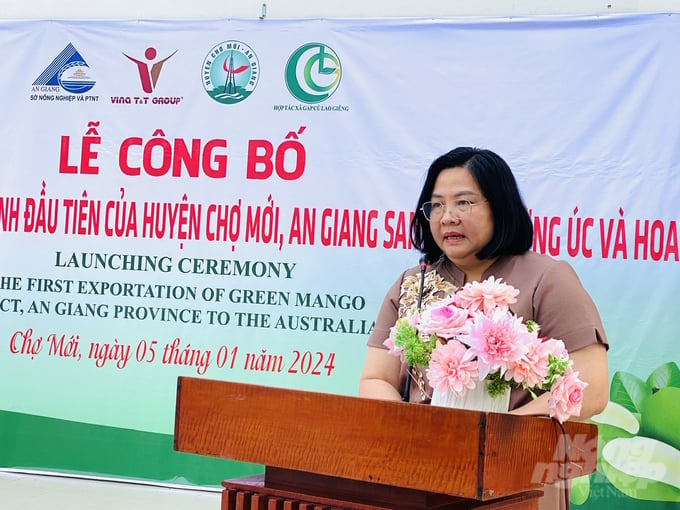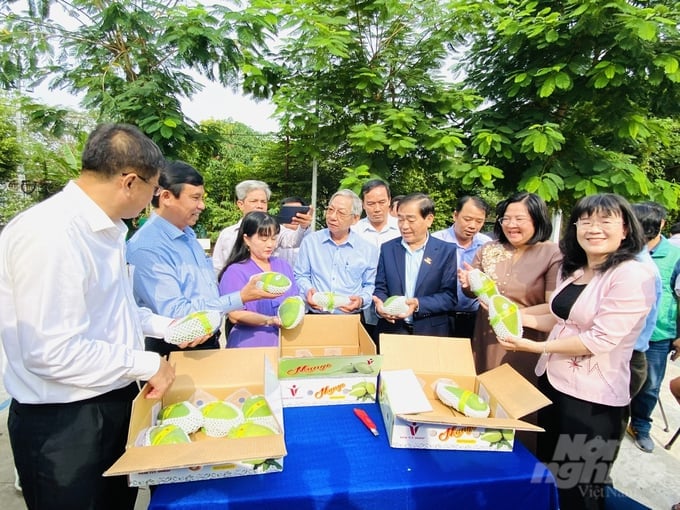June 18, 2025 | 14:14 GMT +7
June 18, 2025 | 14:14 GMT +7
Hotline: 0913.378.918
June 18, 2025 | 14:14 GMT +7
Hotline: 0913.378.918

Ms. Huynh Kim Dinh, Deputy Director of the Department of Economic Cooperation - Rural Development, delivering a speech at the launching ceremony for the first export shipment of green-skinned mangoes from Cho Moi district to Australia and the United States. Photo: Le Hoang Vu.
On the morning of January 5, Cho Moi District People's Committee, in collaboration with An Giang province's Department of Agriculture and Rural Development and Vina T&T Trading and Distribution Company Limited, organized the launching ceremony for the first export shipment of green-skinned mangoes from Cho Moi district to Australia and the United States in Binh Phuoc Xuan commune.
This first export shipment of green-skinned mangoes was the result of a signed contract between the Cu Lao Gieng GAP Cooperative and Vina T&T Trading and Distribution Company Limited. According to the contract, 6 tons of green-skinned mangoes were assigned with a production unit code for export to Australia, and 1 ton of green-skinned mangoes were assigned with a production unit code for export to the United States.
According to Mr. Doan Thanh Loc, Vice Chairman of the Cho Moi District People's Committee, the district houses the largest mango production area in An Giang province, totalling nearly 6.5 thousand hectares. Notably, green-skinned mango production areas are primarily concentrated in Tan My, My Hiep, and Binh Phuoc Xuan communes, totalling approximately 4.2 thousand hectares. The cultivation of green-skinned mango trees first began in Cu Lao Gieng in 2001.
Under the enthusiastic guidance of Dr. Vo Mai, Vice Chairman of the Vietnam Garden Association, 40 farmers from the three communes of Cu Lao Gieng successfully implemented the production of VietGAP-compliant mangoes in 2009.
By 2015, Binh Phuoc Xuan commune had 7.5 hectares of certified VietGAP-compliant green-skinned mango production area. Additionally, this area was also the first in An Giang province to receive a VietGAP certification.
Presently, the local 704-hectare VietGAP-compliant mango production area has been assigned 41 production unit codes for export to various markets around the world, including China, the United States, South Korea, Japan, and Australia.

The first export shipment of Cu Lao Gieng GAP Cooperative's green-skinned mangoes to Australia and the United States has introduced new opportunities for mangoes from the Mekong Delta to extend their reach and compete globally. Photo: Le Hoang Vu.
According to Mr. Ton That Thinh, Deputy Director of the An Giang province's Department of Agriculture and Rural Development, the province has gained a reputation for its large rice production area and high rice yield in the Mekong Delta region. However, the total fruit tree production area in the province has reached 17.9 hectares within the last few years thanks to the successful implementation of crop restructuring. Most notably, the local mango production area has reached nearly 12,303 hectares, with 6.5 thousand hectares located in Cho Moi district, accounting for 52.07% of the total mango production area in the province.
"This export shipment is the result of the concerted efforts and collaboration among farmers, cooperatives, local governments, and businesses," affirmed Mr. Ton That Thinh.

Cu Lao Gieng GAP Cooperative has actively participated in the project to enhance the mango value chain in the Mekong Delta region with the aim of developing towards export to international markets. Photo: Le Hoang Vu.
Ms. Huynh Kim Dinh stated: "There are currently 20,500 agricultural cooperatives in operation nationwide. However, only more than 22% of them are able to effectively market agricultural products to their members. As a result, the roles of the Cu Lao Gieng GAP Cooperative and Vina T&T Trading and Distribution Company Limited in promoting the first shipment of green-skinned mangoes to Australia and the United States are indispensable."
Dong Thap province houses one of the largest mango production area in the Mekong Delta, with a focus on popular and high-quality mango varieties such as Cat Chu Cao Lanh, Cao Lanh, and Cat Hoa Loc. Local mango production is concentrated mainly in Cao Lanh City, and the districts of Cao Lanh, Lap Vo, and Thanh Binh. Dong Thap mangoes have been assigned with 252 production unit codes for export to China. The province has a total of 295 production unit codes for mangoes, which are distributed across 8,300 hectares of production area. Additionally, production unit codes for export to China accounts for the majority with 252 codes, covering an area of over 7,000 hectares.
Translated by Nguyen Hai Long
![Turning wind and rain into action: [9] Digitizing hydrometeorological data in response to climate change](https://t.ex-cdn.com/nongnghiepmoitruong.vn/608w/files/news/2025/06/17/z6704423696987_15fd32ffc26d590d204d520c9dac6786-nongnghiep-165943.jpg)
(VAN) Farmers have begun accessing hydrometeorological applications to adjust their cropping schedules, aiming to ensure productivity and adapt to climate change.
![Turning wind and rain into action: [8] Real-time salinity detection and early warning technology](https://t.ex-cdn.com/nongnghiepmoitruong.vn/608w/files/news/2025/06/17/z6704423696987_15fd32ffc26d590d204d520c9dac6786-nongnghiep-151127.jpg)
(VAN) Thanks to the integration of modern hydrological-hydraulic models, remote sensing technologies, and artificial intelligence, the accuracy of hydrological forecasting has significantly improved.
![Turning wind and rain into action: [7] Early disaster warnings help marine farmers minimize losses](https://t.ex-cdn.com/nongnghiepmoitruong.vn/608w/files/news/2025/06/17/z6704423696987_15fd32ffc26d590d204d520c9dac6786-nongnghiep-142942.jpg)
(VAN) In recent years, thanks to early disaster warnings and forecasting, marine farmers in Khanh Hoa province have been able to reduce risks and losses, thereby improving production efficiency.
![Turning wind and rain into action: [6] ‘Four on-the-spot’ disaster management software](https://t.ex-cdn.com/nongnghiepmoitruong.vn/608w/files/news/2025/06/17/e5a48259d6a262fc3bb3-nongnghiep-183800.jpg)
(VAN) By simply activating the scenario on the disaster management software, the relevant authorities immediately know how many households need to be evacuated, where to evacuate them to, and by what means of transportation…
![Turning wind and rain into action: [5] Hue applies modern technology in disaster forecasting](https://t.ex-cdn.com/nongnghiepmoitruong.vn/608w/files/news/2025/06/17/z6704423696987_15fd32ffc26d590d204d520c9dac6786-nongnghiep-093938.jpg)
(VAN) In Hue city, modern technology has recently been applied in meteorological and hydrological forecasting and warning, helping to reduce the damage caused by natural disasters.

(VAN) A cutting-edge farming technique being implemented on an experimental ranch in Arizona's Sonoran Desert has already saved a billion gallons of water over five years, according to Civil Eats.

(VAN) Poultry and pig production and the environment can be boosted through enhanced water technology, according to new research.